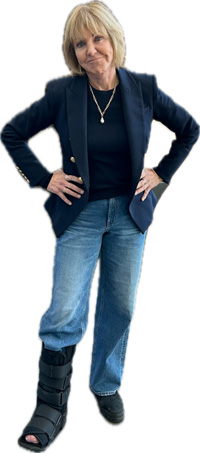I was in Boston just after the new year walking my dog Muffin on the Esplanade, a beautiful park that runs along the Charles River.
Muffin is always interested in the many geese who frequent the area and I do my best to steer her well clear of them. But on this day, having just finished a call with a candidate to whom I had been listening intently, I failed to notice how close we had gotten to the geese.
Muffin did notice…
Suddenly, and before I could even put my phone away, all 55 pounds of her lunged for them, pulling me down a rocky slope towards the pond. I felt my ankle break, my phone went flying, and I landed hard on my back with my head in the water as Muffin continued her quest to get to the geese.
Thankfully, there were several very wonderful people nearby who stopped to help. (Muffin was not remotely remorseful.)
I am now well on the mend. And like all difficulties in life, there has been a very positive side. I have deeply experienced how kind even total strangers — who see my crutches or walking boot — have been. They run ahead to open doors, they ask how I am doing, they share their own “boot” stories and tips, they bring me things in coffee shops so I don’t have to get up.
In addition to making me even more grateful for my typically good health and strong body, this injury has made me acutely aware of how much small acts of kindness matter.
Not All Wounds Are Visible
Of course, when you have crutches or a walking boot, it’s easy for others to see you are struggling. But most “wounds” are not obvious.
A friend whose mom passed away in early December had a difficult time hearing everyone wish her “Happy Holidays.” Some people are having financial difficulties. Others face health issues, addictions, loneliness, family members who are struggling. Not to mention the sheer number of things going on in the world that cause pain.
Why is it we are so quick to help someone with something we can see, but when it’s just a “regular” person, not so much? It’s bad enough when we don’t take the time to thank the barista or uber driver. What about our colleagues and employees?
Those Small Acts Are Equally Applicable in the Workplace
I’ve had countless conversations with talented executives — individuals with unlimited choice about where they work — who tell me they won’t even consider leaving because of some (often small) act of kindness shown to them by their company or manager.
And, of course, I’ve had just as many conversations with talented execs who call asking for help finding a new role solely because of a blatant lack of caring or compassion shown to them (or someone in the company) during a difficult time.
Trust and loyalty can be cemented — or destroyed — in an instant.
Employees as Volunteers?
I had another example of small things mattering when I did some volunteering over the holidays at a food kitchen (pre-injury!). What struck me was how determined the people at the host organization were to make sure we had what we needed and felt good about the experience.
They went out of their way to thank us, check on us, and continually remind us how important and impactful the work we were doing was.
What if we thought of employees as volunteers AND imagined the battles they might be fighting that we can’t see? What would we do differently? How might we pay more attention to them, make them feel more appreciated and seen, help them see the importance of their work and how much we care about them as people?
The most recent Gallup poll showed only 32% of employees were engaged at work. Yikes. Among the top three reasons for disengagement is not feeling valued. (The other two are lack of opportunity for development and lack of clarity of expectations.) Clearly, paying attention and appreciating employees is not just a “nice to have.” On every measure of company achievement, the higher the engagement, the higher the level of success.
A New Start to the New Year
People do better work and think twice about leaving a company that cares about them; great people prioritize joining a company that feels this way too.
As 2025 begins, I am determined to be more curious and attentive, and keep Maya Angelo’s words in mind: “People will forget what you said, people will forget what you did, but people will never forget how you made them feel.” Oh, and to keep a closer eye on the geese, too.
Back to Insights
